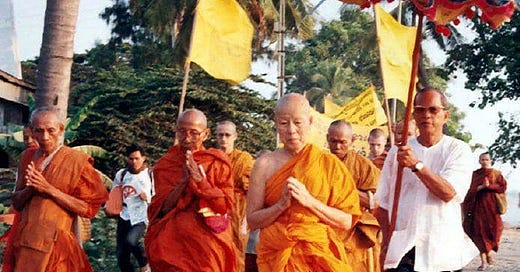TheGentleLaw Community
In the aftermath of one of the darkest chapters in Cambodian history, a single figure emerged as a beacon of hope, resilience, and nonviolent resistance. Maha Ghosananda, often called the "Gandhi of Cambodia," was a Buddhist monk whose life was dedicated to restoring peace, justice, and compassion in a land scarred by war and genocide.
A Life Shaped by Suffering
Born in 1929 in the Kingdom of Cambodia, Maha Ghosananda entered monastic life at a young age, dedicating himself to the study and practice of Theravāda Buddhism. His path took him beyond Cambodia, deepening his knowledge in Thailand and India, where he studied Pāli scriptures and Buddhist philosophy. However, his serene world was shattered when the Khmer Rouge, under Pol Pot’s rule, unleashed a reign of terror from 1975 to 1979.
During this period, an estimated two million Cambodians perished in what became known as the Killing Fields. Among the victims were Maha Ghosananda’s entire family. Yet, instead of succumbing to despair, he chose the path of radical compassion and nonviolence.
The Dhammayietra: A Walk for Peace
After the fall of the Khmer Rouge, Cambodia remained in turmoil, its people divided and traumatized. Maha Ghosananda believed that healing could only be achieved through nonviolence, loving-kindness (mettā), and direct action rooted in Buddhist principles.
Inspired by Mahatma Gandhi’s Salt March and the tradition of Buddhist pilgrimages, he initiated the Dhammayietra, or peace walks, in the early 1990s. These pilgrimages, often through war-torn areas still riddled with landmines, brought together monks, nuns, and laypeople, walking barefoot to spread messages of peace, reconciliation, and forgiveness.
Despite the ever-present dangers of violence and resistance from armed factions, Maha Ghosananda remained steadfast. His mantra, "Hatred never ceases by hatred, but by love alone is healed," became the spiritual foundation of his peace movement.
Keep reading with a 7-day free trial
Subscribe to The Gentle Law to keep reading this post and get 7 days of free access to the full post archives.





